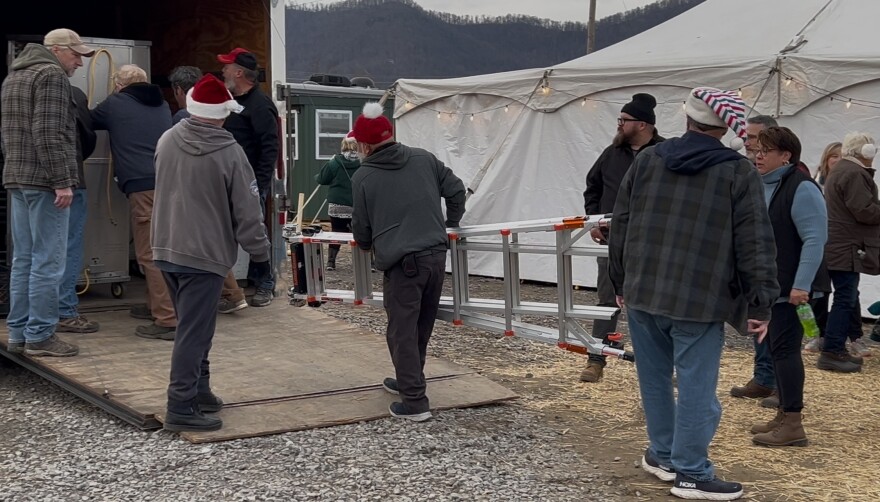Driving into Swannanoa, N.C., it’s hard to find much progress along the main road that now defines what a hurricane ravaged town looks like…in the Blue Ridge mountains.
Families in North Carolina continue to recover in the aftermath of Hurricane Helene, with several nonprofit organizations stepping in to help communities still very much in need as Christmas approaches.
Swannanoa, NC has already seen snow, just imagine living in tents and unheated shacks
— FoxyFarmer🦊🇺🇸 (@GardensR4Health) November 26, 2024
…and y’all….this is nothing….just wait until January when the blizzards and ice hit…..
They’ll be almost a 0% chance of survival for some folks. 💔
I lived these winters, they are cruel pic.twitter.com/V1Ak81jB4B
Next week marks the three month anniversary Helene crippled major parts of western North Carolina and eastern Tennessee. Hundreds of people whose homes were destroyed are still living in campers and tents amid cold temperatures.
As a long hard winter sets in, many residents are still struggling to gain some forward momentum.
Early December delivered snow and biting cold temperatures. And recovery efforts have slowed to a snail’s pace in most of the heaviest affected areas.
‼️ I-40 remains closed near the Tennessee state line after #HeleneNC.
— NCDOT I-40 (@NCDOT_I40) December 17, 2024
👷 Our crews continue to work to make repairs to the interstate.
🚧 We hope to restore traffic to one lane in each direction soon. pic.twitter.com/PlFXfO4KGz
Hurricane Helene emerged as one of the most destructive storms of the year. Helene made landfall on September 26 in the Big Bend area of Florida as a Category 4. Besides the rapid intensification of the storm, the extreme rainfall and flooding is what escalated its devastating impacts.
~4 hour animation of 1-minute #GOESEast Infrared images of Category 4 Hurricane #Helene as it passed Buoy 42036 (where the peak wind gust was 107 mph) & officially made landfall along the #Florida Big Bend coast at 0310 UTC. Note the cloud-top gravity waves. #FLwx @NWSTallahassee pic.twitter.com/lNmFoN9NdQ
— Scott Bachmeier (@Wisc_Satellite) September 27, 2024
Hurricane Helene’s path extended from northwestern Florida to Tennessee, Georgia and the Carolinas. The highest rainfall was in North Carolina with more than 30 inches of rain in less than four days. It overflowed rivers and washed-out neighborhoods and roads. Helene left debris and sand piled so high it completely changed the banks of many of the rivers in this part of North Carolina.
I’m at a loss for words.
— Matt Van Swol (@matt_vanswol) December 10, 2024
This is the Asheville River Walk in #WNC, 74 days after Helene.
How is this America?
Where is the federal response? Where’s the cleanup crews? Where’s FEMA?
I don’t understand. pic.twitter.com/AQT5Ao1ABQ
Helene claimed over 230 lives and left tens of thousands displaced. Residents in Asheville, North Carolina, didn’t have full access to potable water more than 53 days after the storm hit. And the economic toll is staggering, contributing to the 2024 Atlantic hurricane season more than $190 billion in total damages.
AccuWeather's Preliminary Estimate of the total damage and economic loss from #Hurricane #Helene will be between $95 - $110 Billion.
— AccuWeather PR Alerts (@AccuWeatherPR) September 28, 2024
Helene is expected to be one of the costliest storms in U.S. history because of the devastating storm surge, damaging winds and historic flooding. pic.twitter.com/sQJxOwwCDP
As temperatures begin to drop for the season, there are still people in need of a warm place to sleep. There has been a lack of temporary housing. There's not a lot of places for people to go. Hotel vouchers are running out. It is still easy to spot Helene survivors living in donated campers, tents and even their cars in western N.C.

Much of the media attention went to the larger cities like Asheville, but locals in the smaller communities feel they are the fabric of this part of western North Carolina. Stressing that many people that work in Asheville live in the smaller communities just outside the city limits. Locals say they are the glue that holds these bigger towns together.
Volunteers are still donating their time in this part of western North Carolina, but those numbers are starting to dwindle as time marches on ... .Silverados is home base for millions of tons of items, mainly donated from the general public…Firewood, hay, appliances, diapers, food, you name it, is collected and stored here for the people that need it.
Silverados is the largest distribution center in western N.C. They've got goods and free items coming in from all across the Carolinas and the country. The problem is there are stacks and stacks of free goods here but the people that need them don’t have any homes to put them.

During recovery efforts, thousands of volunteers descended upon Western North Carolina, bringing supplies, providing shelter, and removing debris. The random acts of kindness from the community and around the country are an integral piece of this long term recovery.
Some people living in Black Mountain/Swannanoa area, probably get their basic necessities from Silverado’s. Concert venue-turned distribution site. They’re still seeing up to 200 cars a day& giving away toys starting tomorrow. In need of volunteers & teen toys! #WNC pic.twitter.com/PlloSwwimP
— Chelsea Torres (@chelseatorrestv) December 17, 2024
From trail maintenance to disaster relief, volunteers fill gaps that government agencies and private organizations can’t always address. In the wake of Helene, churches, community organizations and individuals stepped up to organize donation drives, provide temporary shelter and clean up flood-damaged areas.
Their efforts demonstrated the resilience of this community. And while challenges will continue to persist in western North Carolina, locals in Swannanoa are confident that they will be able to rebound despite all the challenges that remain.
Copyright 2024 Storm Center

















